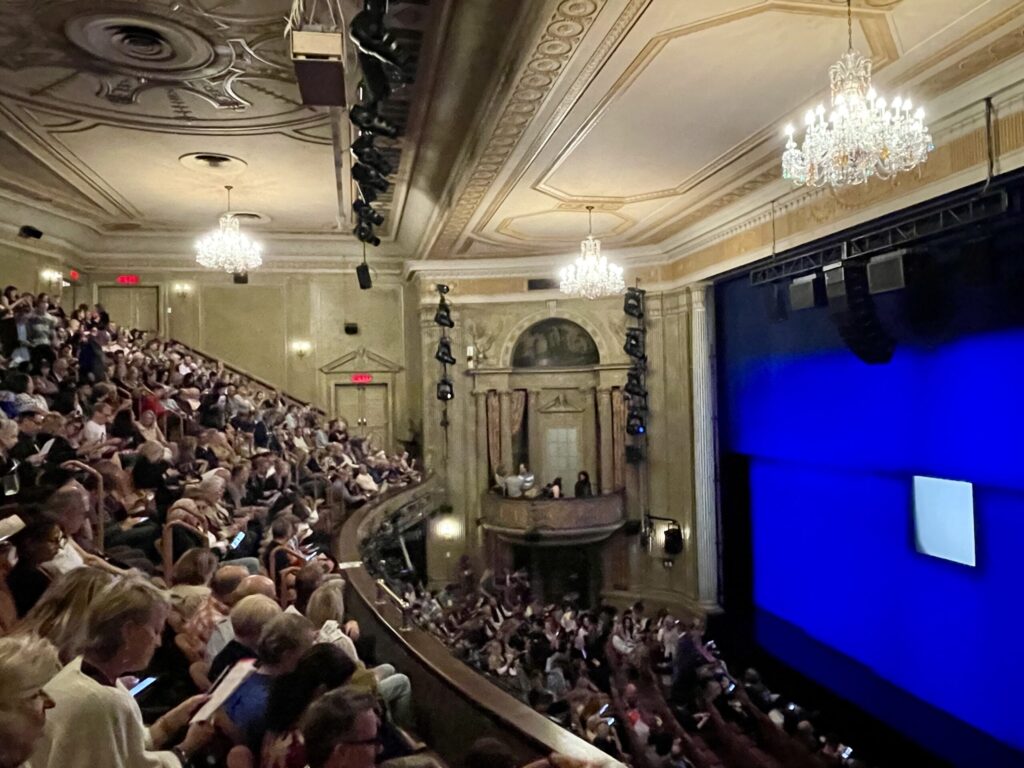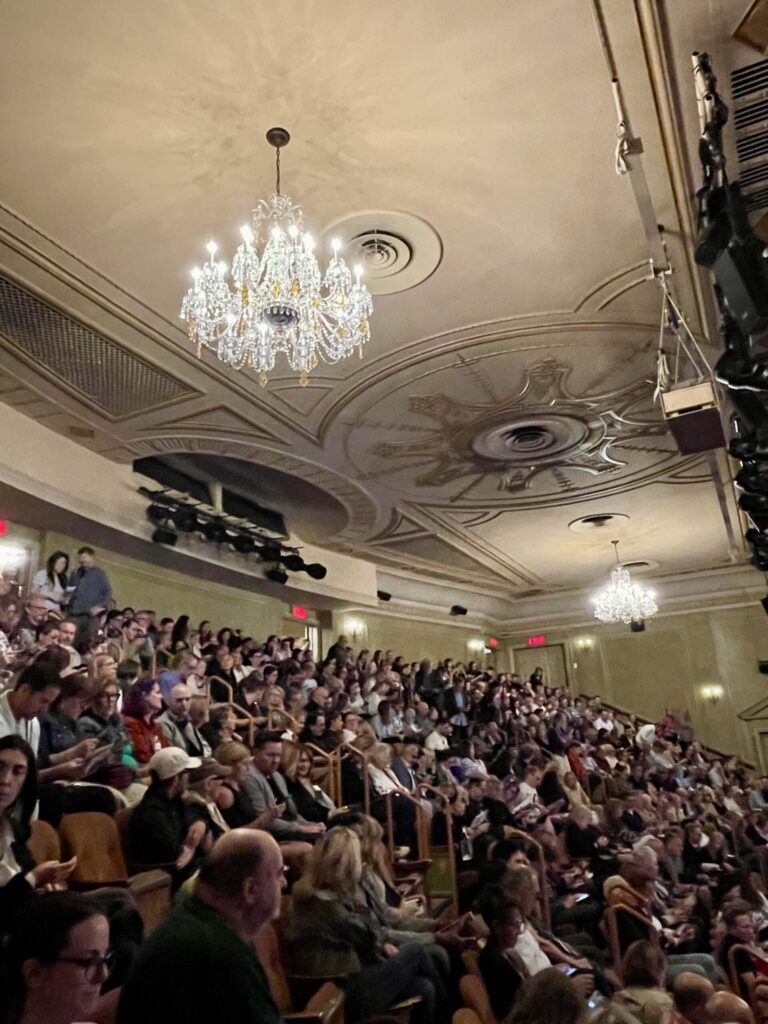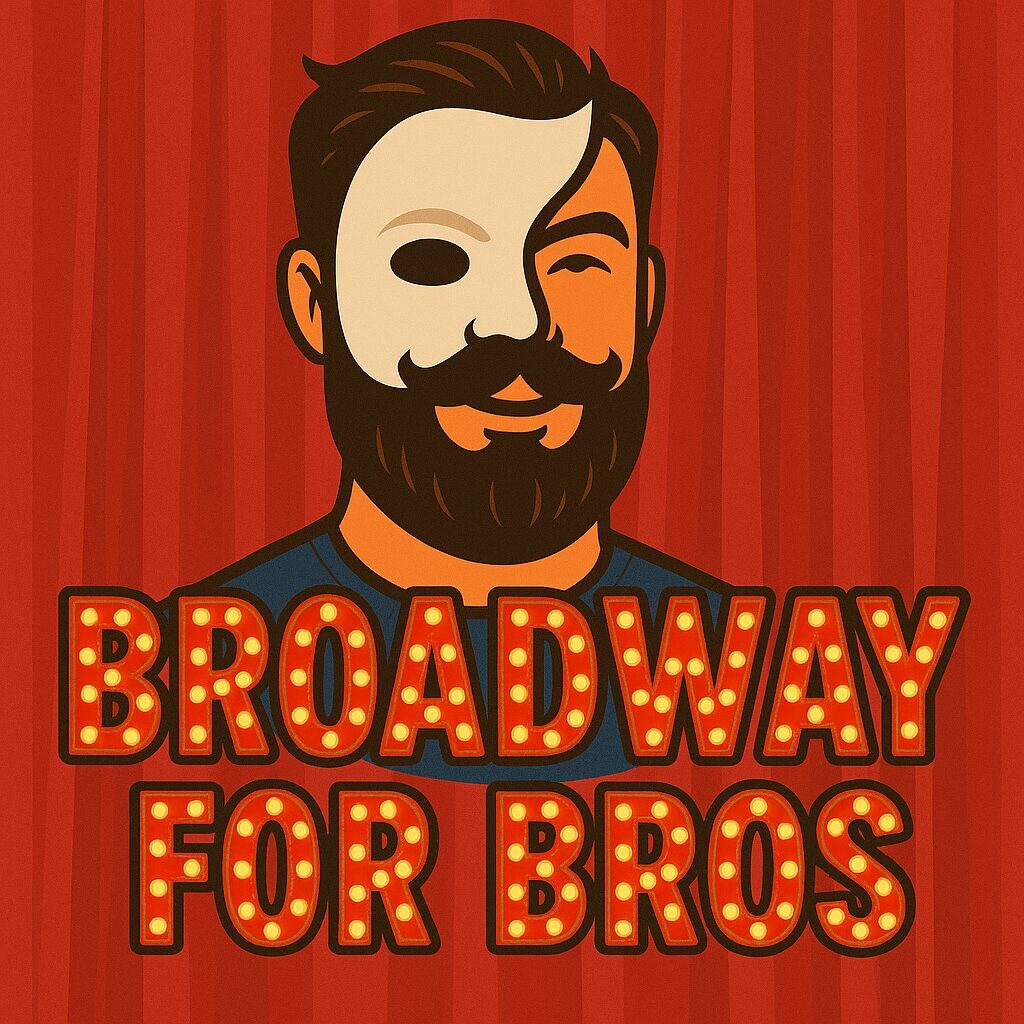Emptiness haunts us all in different ways.
When that emptiness takes physical form, as in a 4” x 5” canvas uniformly painted white with faint diagonal lines you may or may not see, it becomes a kind of Rorschach test. Showcase that painting in your apartment and suddenly your friends’ deepest opinions, insecurities, and projections are splashed across it. That’s both the premise of art as a concept and Art, Yasmina Reza’s play set in Paris. First staged in 1994, this American revival is directed by Scott Ellis (The Marvelous Mrs. Maisel, Take Me Out), who leans into a minimalist aesthetic fitting for a show about three guys and a white canvas.

At its core, Art is about the strained relationship shared by three middle-aged men, each at their own crossroads in life. Those respective crossroads force longtime friends to realize that life never stops changing who we are, and that decades of friendship can be challenged, or even ruined, by our current circumstances and life choices. Middle-aged guys like me can relate to this show because Art delves into the reality that we are constantly being judged based on whom we marry, how we spend our money, and where we declare our allegiances.
At middle age, society considers our lives and souls to be fully formed. Honed over time into a personality and professional identity we can present to others at social gatherings like business cards. But time does weird things to our most valued relationships. Over the years minor grievances can grow into major issues, hidden and anonymous like kidney stones, until one day they decide now is the time they want out. In Art, that catalyst is a $300,000 white canvas that hits each of the characters—Marc (Bobby Cannavale), Yvan (James Corden), and Serge (Neil Patrick Harris)–to the core in their own sadly hilarious way.

In many ways Art has become the white canvas for Broadway fans, because they have strong personal opinions about why someone should love, or hate, the show. James Corden seems permanently reviled after being banned from New York City’s culinary mainstay Balthazar for treating the staff horribly over an egg yolk omelette. I was a waiter and have nothing but contempt for people who are rude to wait staff. I mean, seriously. But I’m also a middle-aged man, like the guys in Art, and none of them, like you and me, are perfect. We have all experienced extremely bad days. James Corden has apologized, profusely. I’m not excusing his behavior, but if you enjoyed MJ (which is energetically captivating) then you can clearly separate the art from the artist.
In contrast, the public adores Neil Patrick Harris, to the point where if you say NPH everyone knows who you’re talking about. We don’t give that type of moniker to people we don’t like. NPH gives a nuanced but accessible portrayal of an insecure, divorced man still bushwhacking his path in life, even after having achieved professional success as a dermatologist. Divorce makes anyone interesting because even if you’ve never met them, you still want to know what happened. We learn that Serge has limited visitation rights to his kids, but NPH’s role is perfectly crafted around a guy who knows—as do his friends—that part of his life is behind him. I’m curious about the backstory, but for a 100-minute show, I agree there is no need to go there. The real drama revolves around the evolving Serge, whose expensive purchase of the white painting is perceived as a departure from his former self, which changes more lives than his own.

And that’s where Marc steps in. As adults we’re supposed to be accustomed to the realities of change and to lean into our maturity whenever life shakes up our comfort zones. Layoffs, for example, suck. A sick or dying parent is heartbreaking. And, dear god, it looks like mullets are going to be a thing again. But we want our friends, and their personalities, to stay the same. Adult guys are notoriously bad at nurturing friendships, so we are territorial about the ones we do have. Our friends know us, which means there are no upfront costs attached to getting to truly know someone and being vulnerable. That type of rewarding relationship, with such low maintenance fees, anchors our sense of self and how our lives will develop. Life is exhausting, maintaining our old friendships shouldn’t be an added drain on our daily struggles.
But life doesn’t work that way. We change. Our friends change. You may even see James Corden politely dining at Balthazar, and by then he may be nominated for a Tony. Good for him. And the show.
Go see Art if you can. Broadway forces you to turn off your phone, and when that happens, your mind is turned on in ways that can help you fill the emptiness of life—with the help of friends you’ve made along the way.
See you under the marquee. – Jim Thompson

